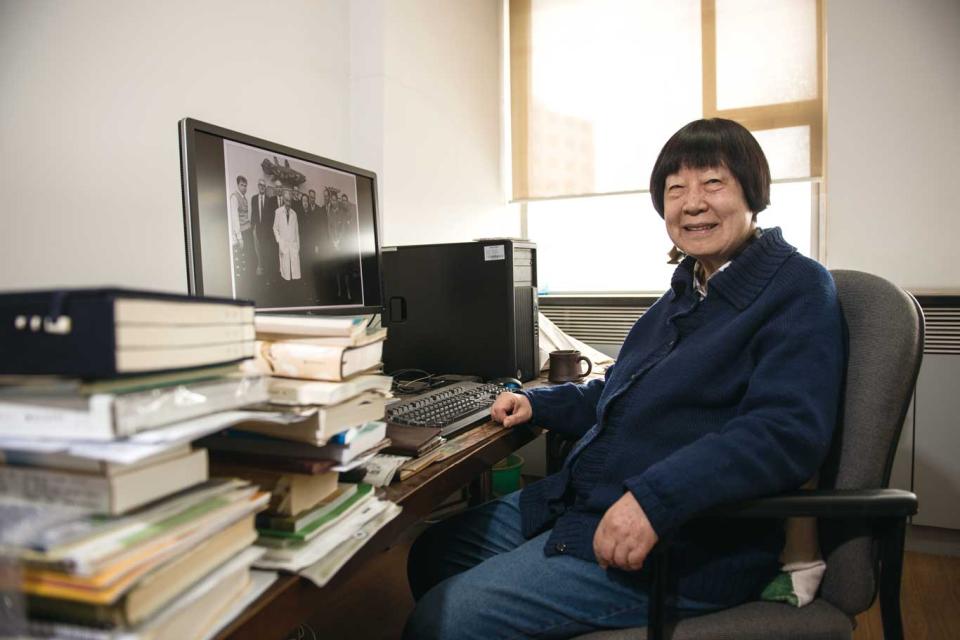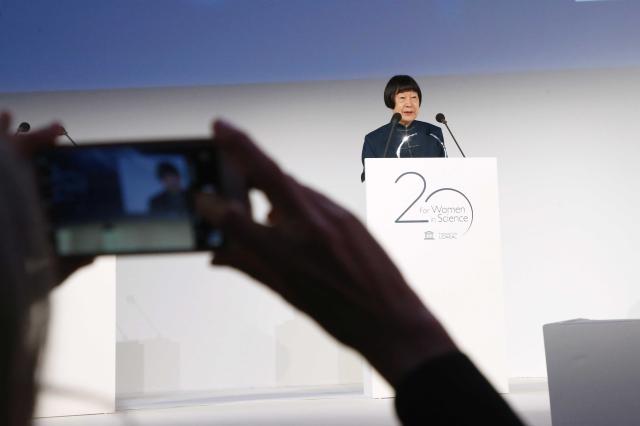“My journey in vertebrate paleontology research started 60 years ago,” Chang recalled in her acceptance speech.
“At that time, I couldn’t choose my own career path. It was all planned [by the country]. The initial relationship between me and paleontology was very much like an ‘arranged marriage’– as the saying goes, ‘marry first, love later,’” she joked, drawing laughter from the audience.
Born in 1936, Chang grew up in an intellectual family in Nanjing, Jiangsu Province. She developed an interest in science at a young age, inspired by her father, Zhang Zonghan, who was an outstanding professor in neurophysiology with a doctoral degree from Chicago University. Her father’s influence saw Chang dream of being a doctor.
This changed when Chang was aged 17 and decided to become a geologist in order to “serve the country” in the same way as many of her peers.
In the 1950s, right after New China was founded, the nation was in urgent need of geological talent. But Chang’s path changed once more in 1955 when she was in her first year of a geology degree at the China University of Geosciences in Beijing, when she was posted to Moscow University to study paleontology.
“At that time, I had no idea what paleontology was about,” she said. Chang and dozens of her peers were sent to study different disciplines of science – including botany and zoology – to meet the needs of China’s scientific development.
At the suggestion of the leading Chinese fish scientist Wu Jianwen, Chang began her lifelong journey in fish studies.
The years in Moscow were a golden time for the young scholar. Chang and her peers collected petrified fish fossils on the riverbank in suburban Moscow; at night they boated on the Moscow River, casting a net and drawing it in at 5 or 6 o’clock in the morning. The crew compared the ancient fossils they collected with modern fish they caught to explore their relationship.
“We kept some of the fish for research, but as for the rest of them, we made delicious fish soup. Quite yummy actually,” the scholar recalled with a mischievous smile.
Chang returned to China, and began working at the IVPP in 1960. She began to “love” the ancient fossils during an early field project in Zhejiang Province.
“Those fossils looked so similar to modern fish, but still different when examined closely. What kind of modern fish did those fossils share kinship with? No one knew. It was a mystery,” Chang said. She grew more fascinated by the mysterious world of ancient fish and sought answers. “The interest grew bit by bit.”
Chang spent three months each year accompanying geological survey teams to collect fossils in the field, a practice she maintained until the age of 80.
The only female scientist in the team, Chang never got any special treatment during the outdoor scientific expeditions. She cut her hair short. She walked 20 kilometers a day, climbed hills and mountains with heavy equipment on her back, and slept on the ground in the wild. “Mosquitos, fleas, bugs and rats, those annoying things never gave us peace,” she recalled.
But now, those tough years are the elderly scientist’s most precious memories. “We were young, always had fun together and never felt tired no matter how hard it seemed,” she told NewsChina.
In 1965, Chang was transferred to the Swedish Museum of National History in Stockholm to study, but the training was short-lived as the Cultural Revolution (1966-1976), which broke out a year later, saw her summoned back to China. It was not until 1980, at the age of 44, that Chang made it back to Sweden to continue her doctoral studies at Stockholm University.
In 1983, Chang became the first female head of the IVPP. As China’s most celebrated paleontologist, she played an instrumental role in reviving the country’s paleontological research, nurtured Chinese graduate students in paleontology, and assumed a pivotal role in fostering international collaborations.
It was the decade in which China gradually woke from isolation and strove to cope with the drastic changes taking place around the world. The surge of new theories, cutting-edge technology and newly established interdisciplinary fields in Western biological research left many Chinese scholars at a loss.
Along with other leading Chinese paleontologists like Zhou Ming-zhen and Yu Xiaobo, Chang spent years translating new academic papers, books and materials into Chinese, compiling them into two anthologies, laying the foundation for the development of modern Chinese paleontology.
“Those translated works had a far-reaching influence at that time. Western theories, after being introduced to China, were immediately put to use to guide scientific research. And the academic gap caused by the Cultural Revolution was gradually filled by the scientists of our generation,” Zhu Min, then a student who helped Chang with translations and who is now a researcher at the IVPP, told NewsChina.

 Old Version
Old Version
